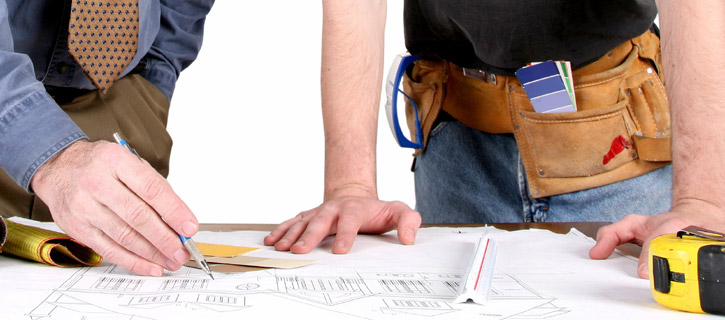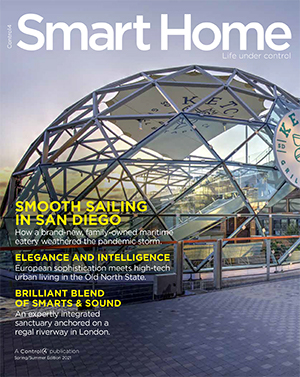Technology Breathes New Life into Old Homes
August 11, 2014
This post comes to us from Lisa Montgomery, Senior Editor at Electronic House and freelance home technology writer.
Just like a new coat of paint or updated countertops, electronic systems should be part of a remodeling plan.
Back in the early days of home automation, most systems were designed to be installed while a home was under construction. It was a wise strategy. The new housing market at that time was strong and healthy, so there were plenty of new homes to wire up for automation, security, lighting and whole-house A/V systems.
Fast forward to 2014. It’s a remodelers’ market, now, as homeowners are choosing to update their current homes rather than building new. According to data from the U.S. Census Bureau, homeowners spent $130 billion on remodeling projects last year, and it’s not only cosmetic upgrades that are driving the upswing in remodeling.
In addition to the new flooring, better windows and professional landscaping, high-tech upgrades have become an increasingly popular update. So what’s high on the list of high-tech improvements? A study by market research firm Nielsen Scarborough points to security systems, energy saving appliances and high-definition TVs.
There are many other high-tech options in addition to these that make sense to include in a remodeling plan. Home automation systems, for example, have been identified by the Joint Center for Housing Studies of Harvard University, to be one of the top trends in residential remodeling over the next five to 10 years.*
Whether the prediction proves accurate or not, the fact remains that manufacturers from all high-tech sectors have made their systems more accessible to owners of existing homes, not to mention more affordable and easier to install.
There are a few major shifts in the home electronics industry fueling the adoption of systems into homeowners’ remodeling projects. One of the most notable is the increasing number of manufacturers choosing to incorporate into their products wireless communications technologies such as Z-Wave and Wi-Fi. The adoption of Zigbee, Z-Wave, Wi-Fi and other wireless standards stretches across all product categories. This trend enables security systems to control thermostats and lights switches, for example, without having to be physically wired together. Today, entire home automation systems can be installed without adding cabling, which makes adding one a feasible home improvement project.
Another trend pushing technology into remodeling plans is the availability of modular systems. These are the types of systems that can be installed to provide basic features at first, but can be easily upgraded and expanded later as a homeowner’s needs grow and change.
Finally, homeowners should have no problem finding a professional home systems integrator to install electronic systems into their existing abodes. As the housing market took a nosedive, pros who had once solely relied on projects in new construction, revamped their business models to focus on renovation work. Over the years, they’ve honed their remodeling skills, have learned what works and what doesn’t, and have fully embraced the opportunities to help homeowners modernize their homes with technology.
So what types of systems are particularly remodeling friendly? Dimmable lighting is always a good place to start, as it can impact so many facets of a home. Simply swapping a standard light switch for a dimmer switch can make a huge difference in the way a room looks, and save some energy to boot. Step up to a whole-house lighting control system—wireless models are available—and you’ll be able to push one button to have every light turn off at bedtime and cue scenes that set the lights for parties, dinnertime and other activities and occasions.
A perfect complement to dimmable, controllable lighting, and also remodeling friendly, are motorized window shades. Many styles are available that are battery-operated, which means the shades don’t even need AC power to move up and down. A command from a wireless remote—or wall-switch—is all it takes to invite in or block out the sunshine, prepare a media room for movie night or preserve your privacy.
Combine the lights and shades with a wireless whole-house music system, and you’ve got a remodeling solution that can completely transform the look and feel of a room, or an entire house. Many of these systems are able to adjust automatically based on the time of day and other conditions, but for even greater convenience and effect, consider tying them all to a retrofittable home automation system. Like the systems it will manage, monitor and control, a home automation system can communicate wirelessly, making it a top choice for your remodeling consideration. With one system in charge, you won’t need as many switches on the walls or have to juggle as many remotes. A home automation system can minimize clutter, and that’s always a good goal for a remodeling project.
*This stat is from unpublished research by the Joint Center for Housing Studies of Harvard University, used with permission by according to Kerry Donahue, Communications Manager at JCHS.
Just like a new coat of paint or updated countertops, electronic systems should be part of a remodeling plan.
Back in the early days of home automation, most systems were designed to be installed while a home was under construction. It was a wise strategy. The new housing market at that time was strong and healthy, so there were plenty of new homes to wire up for automation, security, lighting and whole-house A/V systems.
Fast forward to 2014. It’s a remodelers’ market, now, as homeowners are choosing to update their current homes rather than building new. According to data from the U.S. Census Bureau, homeowners spent $130 billion on remodeling projects last year, and it’s not only cosmetic upgrades that are driving the upswing in remodeling.
In addition to the new flooring, better windows and professional landscaping, high-tech upgrades have become an increasingly popular update. So what’s high on the list of high-tech improvements? A study by market research firm Nielsen Scarborough points to security systems, energy saving appliances and high-definition TVs.
There are many other high-tech options in addition to these that make sense to include in a remodeling plan. Home automation systems, for example, have been identified by the Joint Center for Housing Studies of Harvard University, to be one of the top trends in residential remodeling over the next five to 10 years.*
Whether the prediction proves accurate or not, the fact remains that manufacturers from all high-tech sectors have made their systems more accessible to owners of existing homes, not to mention more affordable and easier to install.
There are a few major shifts in the home electronics industry fueling the adoption of systems into homeowners’ remodeling projects. One of the most notable is the increasing number of manufacturers choosing to incorporate into their products wireless communications technologies such as Z-Wave and Wi-Fi. The adoption of Zigbee, Z-Wave, Wi-Fi and other wireless standards stretches across all product categories. This trend enables security systems to control thermostats and lights switches, for example, without having to be physically wired together. Today, entire home automation systems can be installed without adding cabling, which makes adding one a feasible home improvement project.
Another trend pushing technology into remodeling plans is the availability of modular systems. These are the types of systems that can be installed to provide basic features at first, but can be easily upgraded and expanded later as a homeowner’s needs grow and change.
Finally, homeowners should have no problem finding a professional home systems integrator to install electronic systems into their existing abodes. As the housing market took a nosedive, pros who had once solely relied on projects in new construction, revamped their business models to focus on renovation work. Over the years, they’ve honed their remodeling skills, have learned what works and what doesn’t, and have fully embraced the opportunities to help homeowners modernize their homes with technology.
So what types of systems are particularly remodeling friendly? Dimmable lighting is always a good place to start, as it can impact so many facets of a home. Simply swapping a standard light switch for a dimmer switch can make a huge difference in the way a room looks, and save some energy to boot. Step up to a whole-house lighting control system—wireless models are available—and you’ll be able to push one button to have every light turn off at bedtime and cue scenes that set the lights for parties, dinnertime and other activities and occasions.
A perfect complement to dimmable, controllable lighting, and also remodeling friendly, are motorized window shades. Many styles are available that are battery-operated, which means the shades don’t even need AC power to move up and down. A command from a wireless remote—or wall-switch—is all it takes to invite in or block out the sunshine, prepare a media room for movie night or preserve your privacy.
Combine the lights and shades with a wireless whole-house music system, and you’ve got a remodeling solution that can completely transform the look and feel of a room, or an entire house. Many of these systems are able to adjust automatically based on the time of day and other conditions, but for even greater convenience and effect, consider tying them all to a retrofittable home automation system. Like the systems it will manage, monitor and control, a home automation system can communicate wirelessly, making it a top choice for your remodeling consideration. With one system in charge, you won’t need as many switches on the walls or have to juggle as many remotes. A home automation system can minimize clutter, and that’s always a good goal for a remodeling project.
*This stat is from unpublished research by the Joint Center for Housing Studies of Harvard University, used with permission by according to Kerry Donahue, Communications Manager at JCHS.

